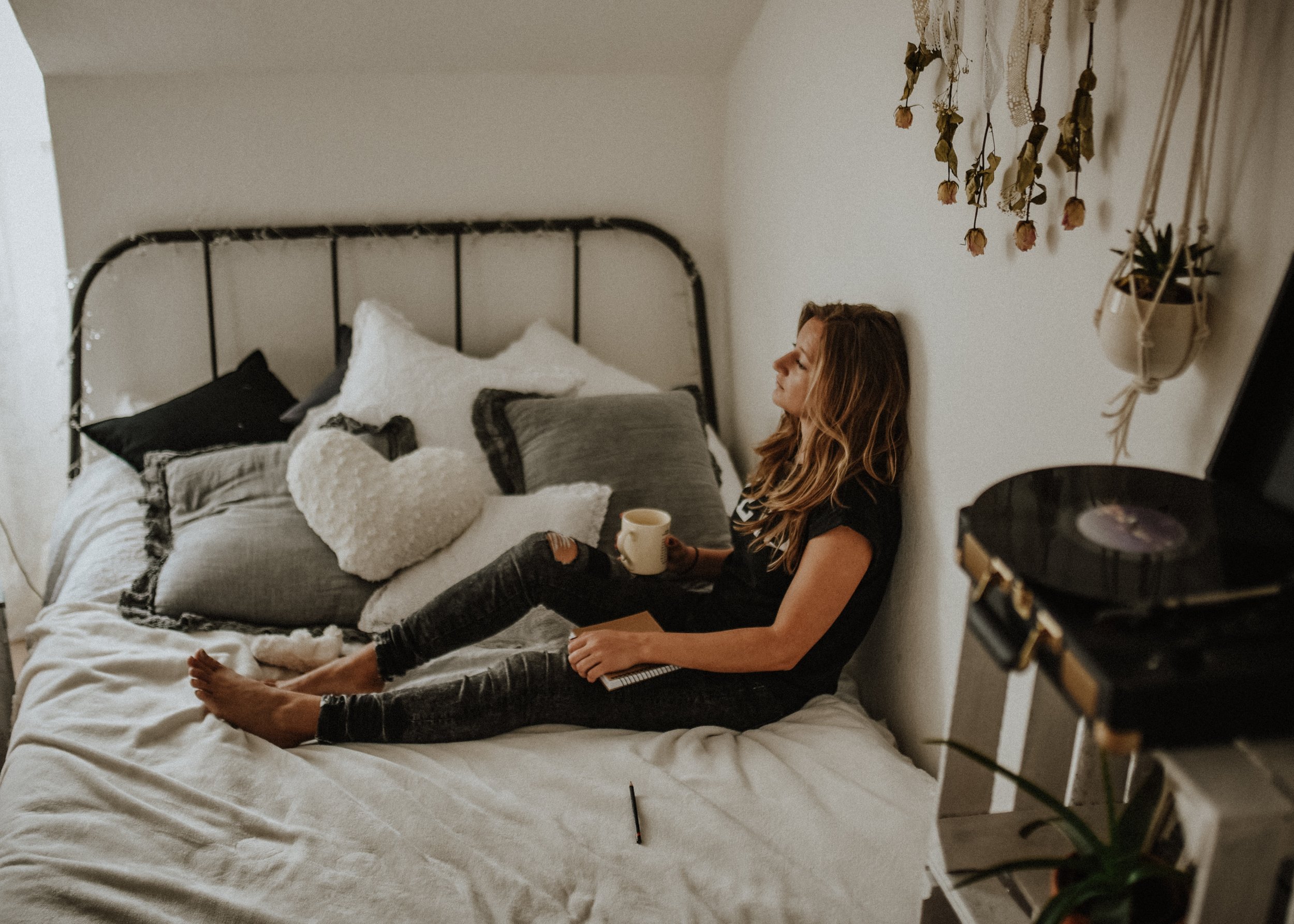So far, 2021 is feeling a lot like 2020. The new year can’t suddenly change what’s happening. I’m feeling all kinds of things about the assault on Capitol Hill by our fellow country people, about the virus’s seemingly unchecked spread throughout the world, and about the rising death tolls.
My feelings of relief and hope around the inauguration and our new President, Joe Biden, and Vice President, Kamala Harris, have filled me up in a way I wasn’t expecting. Hearing the President honor all the lives lost to COVID-19 and encouraging us to work to unify the country brought me to tears.
Although we still face a lot of uncertainty, even with a new president in charge, and so much is still beyond our control, we do have choices.
When we live in the worry of what was or what might be, we lose touch with where we are right now. Even though things feel out of control or worrisome, a lot of lovely things are happening in this moment. And we miss them when the worry consumes us. So, what can we do to feel more grounded and present in our lives?
Last week on the podcast I shared some mindfulness practices to help us feel more present and grounded. I’ve shared a few of these in my newsletter, and if you don’t already get it, you can sign up here, and please forward this blog to someone who might need a little help to bring more mindfulness into their lives.
What Does “Being Mindful” Mean?
When we’re being mindful, we’re bringing our full attention to our sensory experience, to our five senses. You can choose to focus on one—what you see, smell, taste, touch, or hear—or you can focus on a combination of senses. We call the thing you’re focused on your anchor.
Because you’re human, your attention can easily get pulled away to your thoughts and worries. When it does shift away from your focus, because it will, gently, kindly bring it back to the “anchor” you’ve chosen.
Below are a few mindful exercises you can do whenever you have a few minutes. The more you practice mindfulness, the easier it is to pull back from the worry and stress about things you can’t control and be with what is.
On a side note, mindfulness isn’t about seeing the world or our lives through rose-colored glasses. It’s about learning to be with whatever our present-moment experience is.
Five Mindfulness Practices For Your Life
I hope these mindfulness exercises or practices will help you move more mindfully into the springtime.
1. Mindful Journaling
Mindful journaling can be great way to process feelings and be creative at the same time.
Set aside some time for journaling each day. I prefer right before I go to bed but it can be any time that works for you.
Take a moment before you begin writing and check in with how you’re feeling. Are you relaxed and at ease? Are you feeling stressed or anxious? Are there worries and thoughts going round and round in your head?
Write down what you’re feeling, and what that feeling looks like in your body. Give yourself the freedom to write and draw whatever comes to mind.
Can you allow the feeling to be there, without trying to change it?
When you sense that you’ve captured the feelings, thank yourself for taking the time to notice all that showed up for you today.
I’ve shared some prompts for managing anxiety at Upfinch.com. When you sign up, use the code WORRIERS at checkout for 15 percent off the life of your subscription.
2. Mindful Moment
On a warm sunny day, step outside and stand in the grass or on the ground. If it’s warm enough, take off your shoes and socks.
Close your eyes, or gaze softly in front of you. Bring your attention to the bottoms of your feet and where they make contact with the ground beneath you.
Imagine your feet are firmly rooted into the earth below, like a tree. Feel the energy of the earth rising up through your body.
Take a few slow, deep breaths, keeping your focus on your feet.
Stand like this for as long as it’s comfortable. When you’re ready, slowly move your body, open your eyes and refocus your gaze.
If at any time throughout your day you’re feeling stressed, notice your feet on the ground and the feeling of being rooted to the earth.
3. Mindful Minute
Pause what you're doing and take a moment to notice where you are. Name all the different colors that you can see. You can name them aloud or silently to yourself.
4. Listen Mindfully
One of my favorite ways to meditate and be mindful is by tuning in to the sounds around me. As you sit quietly, try to hear as many different sounds as possible. There might be people talking nearby, dogs barking, the wind blowing the tress, birds chirping….
Close your eyes and let the sounds come and go without focusing on any one of them. When your attention gets pulled in one direction, gently bring yourself back to all the sounds washing over you. You can set a timer for three to five minutes or do it for as long as you like.
When the time is up, open your eyes, take a deep breath and go on with your day.
5. Mindful Winter Walk
Sometimes it’s hard to get motivated to walk when it’s cold and gray, but walking in the winter can be a sensory-filled experience that can warm your heart.
Bundle up and take yourself to a park or nature preserve or take a walk in your neighborhood.
Before you begin your walk, pause and take a deep breath. Feel your feet on the ground. Rock back on your heels and then up to your toes if this feels comfortable.
Remind yourself that while you’re walking, you’re going to tune into your sensory experience.
Take some time with each of your five senses. First notice the smell of the earth, leaves, the air. How many different odors do you smell?
Then look around and bring an awareness to all the colors and shapes you can see as you’re walking.
Notice where your feet make contact with the earth and the clothes on your skin. Do you feel cold or warm? Which parts of you feel warm or cold? Notice your body moving and your breath as you inhale and exhale.
Now notice all the different sounds that come and go. Do you hear the wind? Maybe you hear birds chirping or ducks and geese flying past. Maybe you hear small animals scurrying through the underbrush.
If you have water with you, take a sip and notice the taste and how it feels in your mouth.
Allow all of your senses to come alive as you walk.
Why l Love Mindfulness
Mindfulness has helped me to feel more present with all of my feelings and experiences. For example, being fully present for those moments when I come downstairs from my office and Elvis (my dog) greets me as if I’ve been gone for days brings me so much joy. I’m able to soak up his love and let the worries be. It helps me be reminded that even in the struggle there can be ease and connection.
If you’d like more tips for being mindful in everyday life, you can sign-up for the newsletter and get my meditation and mindfulness guides for FREE!
I’m excited about this collaboration and happy to share that Upfinch is sponsoring the Woman Worriers podcast for the month of January. When you subscribe to the Upfinch platform, the first month is free, and they’re offering Woman Worriers podcast listeners and newsletter subscribers a 15-percent discount off their monthly subscription when you enter the coupon code “WORRIERS” at check-out!
>> You can find the guides here.
>> And sign up for your 15% discount here.
The journals are private and never accessed by humans or software.
Elizabeth Cush, LCPC is a therapist, blogger, creator and host of the Woman Worriers podcast, and the owner of Progression Counseling in Annapolis, Md and she’s been featured in these major publications. Elizabeth helps busy, overwhelmed men and women manage their anxiety and stress so they can live their lives with more ease, contentment and purpose. If you'd like to know more about how individual, online and group therapy can help ease anxiety contact me!


































